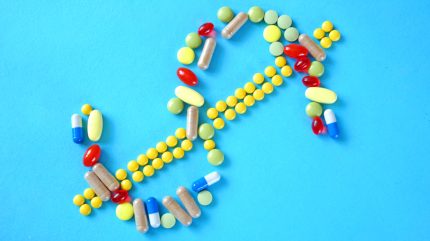
One of the biggest patent cliffs is set to hit the pharmaceutical industry this decade, with major players bracing for a blow to their revenue streams, according to market analysis.
A recent report by GlobalData projects that the share of global drug sales under patent protection will decline by 2030. Only 4% of global drugs sales will have patent protection, compared to 12% and 6% in 2022 and 2024.

Discover B2B Marketing That Performs
Combine business intelligence and editorial excellence to reach engaged professionals across 36 leading media platforms.
Historically, the loss of patent exclusivity can have big bearings on a company’s financial prospects. Biosimilars and generics flood the market upon patent loss, which exerts pricing pressure on the branded product.
There has been a push by the Trump administration to increase biosimilar and generic drug use in the US. In May 2025, the US president signed an executive order that overhauled pharmaceutical pricing in the country. According to a Reuters article, pharma companies launched new US drugs at prices 35% higher in 2023, compared to those launched in 2022. Biosimilars and generics can be as much as 80% cheaper than branded alternatives.
For example, AbbVie’s anti-inflammatory blockbuster Humira (adalimumab) used to be one of the top-selling drugs world, with the drug generating $21.2bn in sales in its last year of market exclusivity. Whilst still a heavyweight in the monoclonal antibody arena, revenue is forecast to slump to $2.6bn by 2030, as per a separate analysis by GlobalData.
Other drugs are set to face competition too, with both MSD’s Keytruda (pembrolizumab) and Johnson & Johnson’s (J&J) Darzalex/Faspro (daratumumab and hyaluronidase-fihj) losing US exclusivity by 2029, representing a particular headwind in oncology. Keytruda, approved to treat a range of solid tumours, was the top selling drug in the world in 2024, netting over $29bn in annual sales.

US Tariffs are shifting - will you react or anticipate?
Don’t let policy changes catch you off guard. Stay proactive with real-time data and expert analysis.
By GlobalDataRevenue loss for MSD and J&J’s products will contribute to a US drug market that is set to lose over $230bn between this year and 2030.
Bristol Myers Squibb (BMS) is forecast to be most affected by the patent cliff. Anticoagulant Eliquis (apixaban) and immunotherapy Opdivo (nivolumab), two of BMS’s blockbuster drugs, account for a significant portion of company’s annual revenue. They are both set to lose exclusivity over the next few years, with GlobalData analysts forecasting a dent to BMS’s financial outlook.
George El-Helou, strategic intelligence analyst at GlobalData, comments: “More than half of the top 15 pharma companies are expected to face challenges in managing the impact of the upcoming patent cliff. However, some companies have pipeline drugs forecast to offset part of these losses.”
A company expected to fare well during this time is Eli Lilly, with revenue forecast to improve by 165% in 2030. This will largely be driven by the company’s glucagon like peptide-1 receptor agonist (GLP-1RA) tirzepatide, sold under the brand names Mounjaro and Zepbound for weight loss and type 2 diabetes respectively.
El-Helou noted that pharma companies could strengthen their pipelines by acquiring early-stage biotechs developing promising therapies, increasing investment in R&D, and targeting diseases with high unmet needs.
Hannah Hans, head of pharma strategic intelligence at GlobalData, says: “It is critical to plan from both a patent and regulatory perspective, while also embedding lifecycle management strategies early on in development. This integrated approach will help optimise long term value. The current patent cliff implications on pharma companies include loss of revenue and pricing pressures, however there are several opportunities for companies to focus on innovative therapies and re-defining their portfolio.”
Hans concludes: “This opens up a significant opportunity for biotech companies to partner with pharma on next generation therapies, novel delivery platforms and differentiated formulations as companies look to strengthen their pipeline.”




